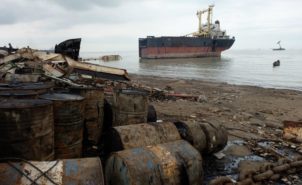
By Nicola Mulinaris and EnvJustice.
But today more than 80 percent of the obsolete ships strand in three major toxic hotspots: Sitakundu beach in Bangladesh, Alang beach in India and Gadani beach in Pakistan.Higher social and environmental protection standards in Europe, Japan and Taiwan have shifted the business of ship recycling to areas where the legal framework is weak or corrupted.Hazardous materials At the hundreds of shipbreaking plots that operate on the three South Asian tidal mudflats, little care is given to worker safety and the protection of the environment. Unskilled migrant workers, some of them children, are deployed by thousands to break down the large ships manually, without proper protective equipment.Accidents kill or maim workers each year. The toxins released by the shipbreaking activities ravage sensitive coastal ecosystems. They already killed dozens of aquatic species and destroyed the livelihoods of surrounding fishing communities.Ships are full of hazardous materials: asbestos dust, lead, organotins (e.g. the extremely toxic TBT), polychlorinated organic compounds (PCB), by-products of combustion (e.g. PAHs), dioxins and furans. These are just a few of the harmful substances that were found both on the yards and in the workers’ sleeping quarters close by.These pollutants affect the growth of marine biodiversity and permanently alter the physiochemical properties of the coastal habitat.Safe and clean alternatives to the beaching yards exist. Yet, facilities with the necessary infrastructure for this heavy and hazardous recycling industry are not used.No accountability Ship owners prefer to sell their ships to yards that use low-cost methods because it increases their profits by millions.They give priority to high scrap prices at the detriment of human lives and the environment. The shipping industry spends more money on greenwashing the beaching practices than on establishing partnerships with proper facilities.Ship owners are not used to being held accountable for their substandard practices. Whilst global shipping transports as much as 90 percent of our goods around the world, it falls much under the radar when it comes to its negative social and environmental impacts, such as CO2 and sulfur emissions, the precarious treatment of seafarers, and its deplorable shipbreaking practices.It is extremely easy for the shipping industry to circumvent existing laws that aim to protect developing countries from toxic waste dumping. It will also be easy for ship owners to circumvent the new laws at the European and UN level that flag states are meant to uphold.Indeed, unscrupulous scrap dealers, known as “cash buyers”, re-flag the vessels on their last voyage to flags known for their poor implementation of international maritime laws.Peer pressureThe European Union is however publishing a list of global facilities that comply with high environmental and occupational health and safety standards, and they are increasing the pressure on ship owners to use that list.Shipbreaking Platform, a global coalition of environmental and human rights organisations, is closely following that process. They advocate to reverse the current shipbreaking scandal and to achieve responsibility upstream from states and from the shipping industry.Working with progressive industry stakeholders and policymakers, whilst at the same time revealing illicit business practices, the Platform is seeing traction for its call for reforms.New European laws, that aim to divert an increasing number of ship owners towards safe and clean ship recycling, will become applicable on 1 January 2019.Peer pressure from investors, financers and the clients of shipping is increasing, and they are expressing clear support for the Platform’s human rights and environmental objective to end the dangerous and polluting practice of breaking ships on tidal beaches.Criminal chargesAs a result of the Platform’s revelations, and for the first time, criminal charges are being pressed in the Netherlands against a ship owner for having traded vessels for dirty and dangerous scrapping.Similar cases are being investigated in Norway, Belgium, Germany and the UK, involving well-known shipping companies and the largest cash-buyers – scrap dealers specialized in selling ships to the beaches.It is high time that the shipping industry is held accountable for the harm that it causes when vessels come to the end-of-life stage. It is also high time that policy makers make serious efforts to boost better practices.
This Author
Nicola Mulinaris works for the NGO Shipbreaking platform. He wrote this piece as part of the EnvJustice blog series. The EnvJustice research project studies and contributes to the global environmental justice movement. The EnvJustice team includes Sofia Avila, Daniela del Bene, Federico Demaria, Irmak Ertör, Juan Liu, Joan Martinez-Alier, Sara Mingorria, Grettel Navas, Camila Rolando Mazzuca, Brototi Roy, Arnim Scheidel, Julie Snorek (Institute of Environmental Science and Technology, Autonomous University of Barcelona) and Nick Meynen (European Environmental Bureau).

The project ENVJUSTICE has received funding from the European Research Council (ERC) under the European Union’s Horizon 2020 research and innovation programme (grant agreement No. 695446)